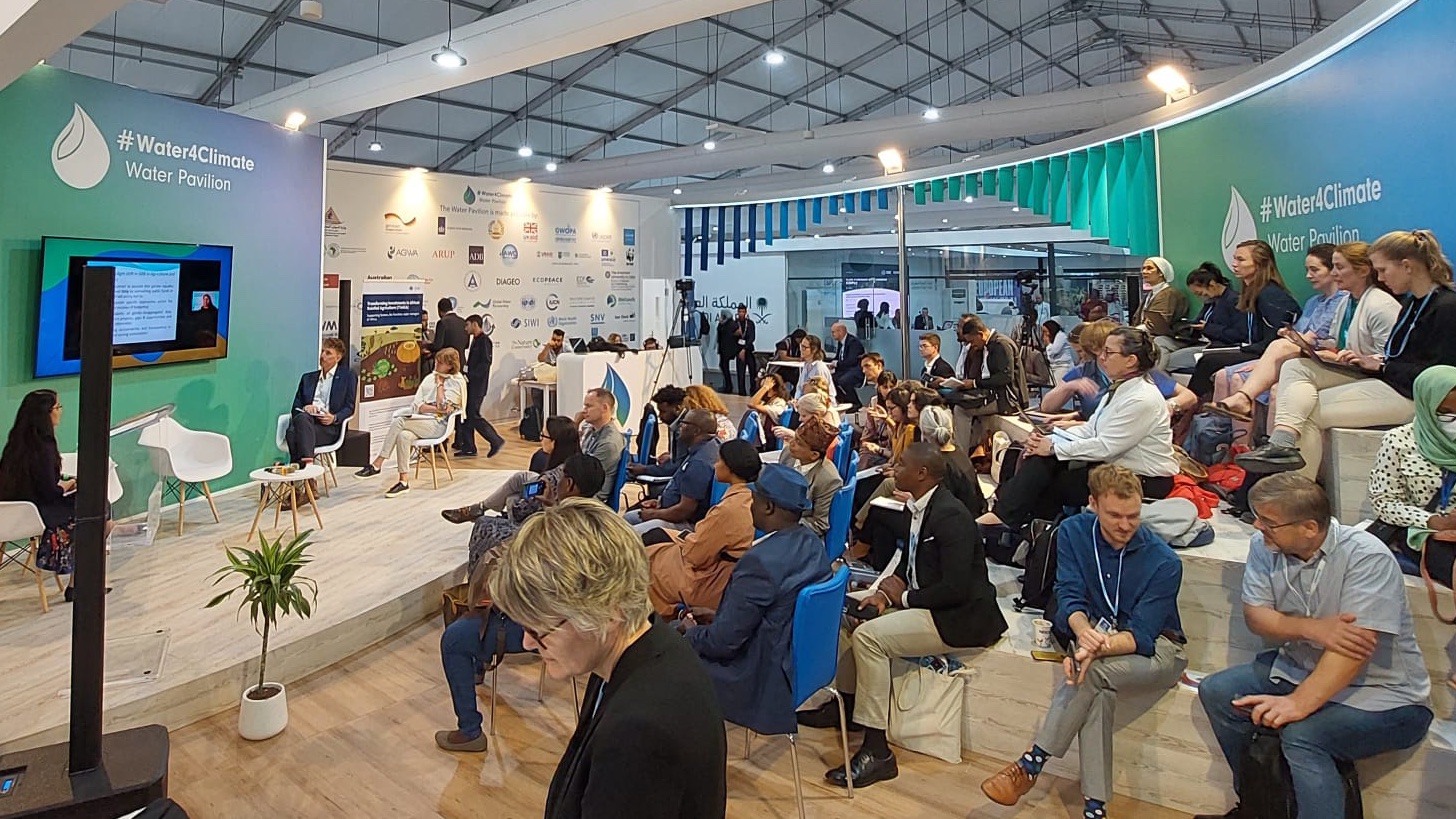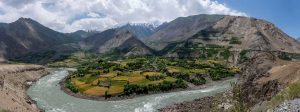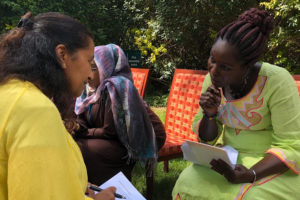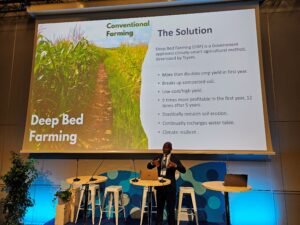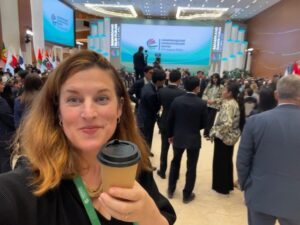Water and Climate: A Journey from Sharm El Sheikh to New York City
The Intergovernmental Panel on Climate Change (IPCC) 6th assessment working group 2 report indicates that water-related climate hazards, such as water-scarcity, floods, and droughts are already affecting billions of people worldwide, and will further increase in frequency and intensity. Climate change and extreme weather events are disrupting the hydrological cycle, affecting water security, and causing physical loss of water worldwide.

These trends gravely threaten food security, livelihoods, and ecosystems – causing loss and damage and particularly affecting persons already in vulnerable situations in the world’s deltas. The report points to several alarming developments and places where water is the centre of climate adaptation and confirm that better water management reduces vulnerability to climate change, and call upon action for five key transitions, including in conserving, protecting, and restoring freshwater ecosystems.
This is particularly true for Africa. Although Africa has contributed least to the climate crisis, it is the most vulnerable to its devastating consequences. Therefore, Africa’s priorities were highly present to be addressed in COP27 in Sharm-El-Sheikh, as well as to make the COP one in which we shift from pledges to delivery and implementation using this exceptional opportunity to promote synergies between the water and the climate agendas, through the outcomes of COP27 and the UN 2023 Water Conference.
Consequently, the Egyptian Presidency of COP27 brought water to the heart of climate action through multiple activities including; the COP27 Summit’s round table on Water Security, the Water Pavilion, and more importantly, the first Thematic Water Day. These prominent activities were concluded by introducing water for the first time in the COP Cover Decision “the SHIP” Sharm el-Sheikh Implementation Plan.
The COP27 Water Pavilion took place during the whole period of the conference with the COP26 Water Pavilion partners joining forces under the leadership of the Ministry of Water Resources and Irrigation (MWRI) of Egypt. SIWI was selected as the Implementing Partner responsible for the fundraising and general implementation guidance for the Water Pavilion and FAO as the main partner. A Steering Committee (SC) was selected including the Governments of Egypt, Germany, the Netherlands, Tajikistan, and the United Kingdom, as well as the Alliance for Global Water Adaptation (AGWA), Food and Agriculture Organization of the United Nation (FAO), International Water Management Institute (IWMI), Sanitation and Water for All (SWA), and Stockholm International Water Institute (SIWI).
The Water Pavilion hosted a total of 59 events throughout the 10 thematic days, showcasing the role of finance, technology, science, Nature based Solutions (NbS), inclusion and holistic approaches in water-related climate change adaptation and mitigation. In total, the Water Pavilion welcomed 450+ individual speakers and each of the sessions were well attended with a physical audience on an average of 230 people each day. The Pavilion saw 3500 physical participants throughout COP27, and the virtual participation included over 12,600 individuals across the two weeks. On top of this, the Water Pavilion successfully became a space for concrete action, showcasing the launch of over 15 initiatives and reports. The Water Pavilion hosted more than 63 bilateral meetings between partner organizations and external actors.
Throughout the Pavilion, water was highlighted as a connector across sectors that has a significant role to play in reaching global agendas. This includes the Agenda 2030, as water security is relevant to most, if not all, Sustainable Development Goals (SDGs). A repeated call was made for inclusive cooperation at all levels. The fields of land and water governance must become more inclusive and adaptable. Cooperation across sectors, actors, and borders must be enhanced. The key messages highlighted the importance of including traditionally marginalized voices in all decision making and the value of indigenous knowledge. Related to this was the call for locally led action and championing those most affected by climate and water challenges. A need to shift to a more action-oriented approach with concrete measures on the ground that should be felt by the local communities was emphasized in addition to a general need for enhanced cooperation and collective action including water related Disaster Risk Reduction (DRR,) adaptation and resilience in the context of river basin management.
About the Network
The Women in Water Diplomacy and Water Management promotes promotes women water professionals’ participation in decision-making in the water sector and gender mainstreaming in water governance, inthe Nile region and Central Asia and Afghanistan.
The Women in Water Diplomacy network in the NileWomen in Water Management in Central Asia and Afghanistan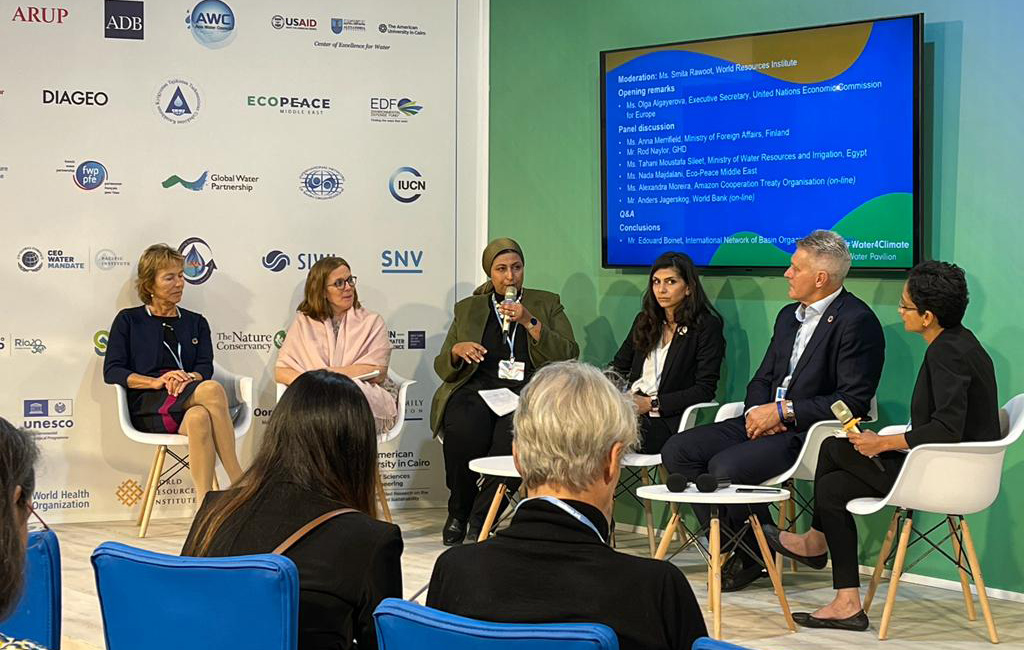
Moreover, the key messages of COP27 Water Day emphasized that urgent actions are required to secure water for vital human needs against escalating challenges; high level political commitment and joint efforts are essential to implement adaptation projects in transboundary basins while committing to the principles of cooperation, mutual benefit, and no harm. The messages also highlighted the crucial need to collect water-climate data and exchange data on open and transparent platforms since fragmentation and gaps in water and climate data at the local, national, and regional levels constitute one of the biggest challenges to climate change adaptation, as well as floods and droughts risk management.
The thematic discussions during COP27 and the relevant prior intensive consultation culminated into a transformative, action-oriented, and game-changing initiative AWARe “Action on Water Adaptation and Resilience” that was introduced at COP27 to the Water Action Agenda of the UN 2023 Water Conference. AWARe complements key initiatives, including the UN Secretary General’s initiative on Early Warning Systems and the Global Water Information System of the Water and Climate Coalition. AWARe aims to support cooperative water-related adaptation, catalyze action to decrease global water loss and improve supply, and enhance co-benefits through decreasing demand for water and decoupling economic growth from water use and degradation. The Water and Climate Leaders’ Coalition, launched by WMO and UN Water, seeks to contribute to these efforts by pursuing an integrated water and climate agenda and accelerating the implementation of SDG 6.
COP27 achieved a breakthrough agreement to provide “loss and damage” funding to the most vulnerable countries impacted by the effects of climate change. Creating a specific fund for loss and damage marked an important point of progress. To continue and build on this COP27 achievement, there is a need to adopt an “Inter-COP” process to connect, integrate, and fully implement water-related decisions at the global assemblies, conventions, and frameworks, which are dedicated to climate, resilience and the environment.
The key messages and the outcomes of COP 27 constituted food for thoughts for Interactive dialogue 3 “Water for Climate, Resilience and Environment: Source to Sea, Biodiversity, Climate, Resilience and DRR” chaired by Egypt and Japan at the UN 2023 Water Conference in New York. Interactive dialogue 3 addressed water-related climate challenges and various potential countermeasures. Most importantly, concrete actions and commitments have been reiterated:
- decoupling water consumption and economic activity as a prerequisite to achieve water sustainability and climate resilience,
- mainstreaming integrated policy frameworks which combine integrated water resources management (IWRM) with other holistic water-related approaches that link the interconnected ecosystems of the hydrological cycle with the associated socioeconomic processes,
- developing, and adopting national mechanisms for cross-sectoral coordination and mutually agreed mutually beneficial no harm-based policies for cooperative water-related adaptation,
- developing a Global Water Information System as a prerequisite for climate action and disaster risk reduction,
- facilitate finance allocation and cost-effective implementation,
- and the importance of a follow-up mechanism for the actions and commitments that will result from the conference, as a key step to achieving concrete advances in the field of water and climate in the coming years.
A number of tangible commitments were made to endorse game-changers, including AWARe, the Kumamoto Initiatives and Coalition, Early Warning for All, PREPARE program, and the UN action program on water scarcity and national water grid. In association with the commitments, useful recommendations were proposed to galvanize transformative actions including promoting Environmental Economic Accounting; Hydro SOS; signing on Fair Water Footprint Declaration; joining World Drought Resilience Network, supporting Special Envoy for Water, strengthening water inclusion in the COP processes and commitments, creating thematic platforms on “from source to sea” and “water, culture and heritage”; and establishing symbolic days on specific subjects such as cryosphere and lakes. Throughout the dialogue, many stressed the importance of science and technology for water transformation. The key for breakthrough is, among other things, the Open Science Policy, facilitation between science and decision making, end-to-end approach, and water cycle integration.
